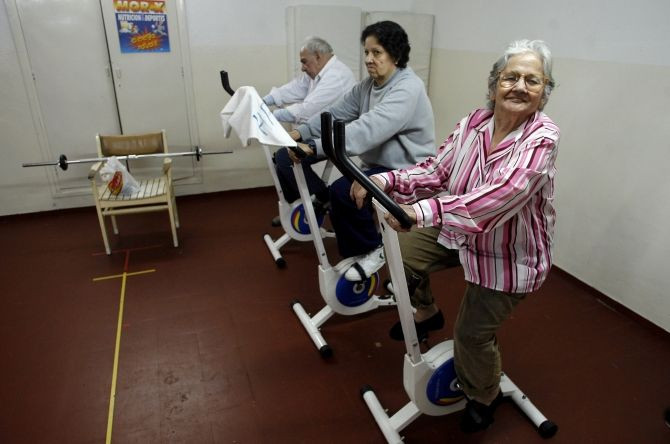Exercising in Midlife May Reduce Your Risk for Chronic Diseases in Old Age

We all know by now that exercise is good for you. Exercise can help you lose weight, relieve stress, and even reduce cigarette cravings. But now, a study suggests that exercise can help prevent you from getting sick - and not just from colds. The study from the University of Texas Southwestern Medical Center, Dallas says that exercise can lower your risk for chronic diseases later in life.
The study, published in The Archives of Internal Medicine, analyzed the fitness levels for 18,670 healthy people in midlife. The average study participant was 49 years old. Researchers then analyzed data from their Medicare coverage, which they started to receive between the years of 1999 and 2009.
Researchers wanted to evaluate their risks for eight chronic diseases to which people are more susceptible with age: Alzheimer's disease, cardiac problems, colon cancer, diabetes, kidney disease, lung cancer, obstructive pulmonary diseases and stroke.
In order to assess participants' level of physical fitness, researchers administered a treadmill test. The subjects were ordered to exercise until they were exhausted. Investigators recorded how long it took for participants to stop exercising.
For men who exercised the least amount of time, those who fell in the lowest 20 percent, 28 percent of them were likely to develop a chronic disease in a year. Meanwhile, the men who were in the highest 20 percent of participants, 15 percent of them were likely to develop a chronic disease.
Women saw a similar disparity; women in the highest 20 percent had an 11 percent chance per year of developing a chronic disease, while the lowest quintile had a 20 percent chance of developing one.
Researchers stop short of saying that exercise definitively helped people to evade chronic diseases. According to the abstract, they controlled for "age, body mass index, blood pressure, cholesterol and glucose levels, alcohol use, and smoking," but not for eating habits. Therefore, researchers do not know whether eating habits or exercise is a bigger factor in developing chronic disease.
In addition, researchers did not find that exercise helped extend the length of a life.
But, of those who were less fit, they spent twice as much of the final five years of their lives with four or more chronic diseases. For those who were more fit, they spent 34 percent more time with only one or more chronic diseases than the least fit.



























